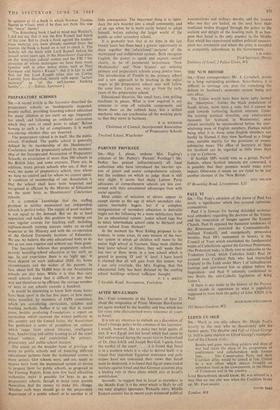PREPARATORY SCHOOLS SIR,—A recent article in the Spectator described the
preparatory schools as 'inadequately inspected, ineptly staffed, providing boarding-school education for many children at too early an age, frequently too small, and following an outdated curriculum which they were at small pains to adapt.' Before bowing to such a list of compliments it is worth considering whether they are deserved. The preparatory school is in itself, like the public school, ill-defined. The public school is generally; defined by its membership of the Headmasters' Conference, and the preparatory school by member- ship of the Incorporated Association of Preparatory Schools, an association of more than 500 schools in the British Isles, and some overseas. There are, in addition, many private schools who use, if they so wish, the name of preparatory school, over whom we have no control and for whom we cannot speak. A condition of membership of our Association is that the school shall have been inspected and recognised as efficient by the Minister of Education on the same basis as Headmasters' Conference schools.
It is common knowledge that the staffing problem in neither maintained nor independeqt schools is perfect today. The supply of good teachers is not equal to the demand. But we do at least appreciate and tackle this problem by running our own regular courses for- teaching staff, including eighteen-month training courses under an ex-staff inspector at the Ministry and with the co-operation of th'e Oxford University Institute of Education. We are, we believe, the only educational body to do this at our own expense and without any State grant.
The Spectator believes that preparatory schools provide boarding-school education at top early an age. In our experience there is no 'right age.' It must depend on each individual child, his home circumstances and the wishes of his parents. In fact, about half the 56,000 boys in our Association schools are day boys. While it is true that very small schools today find it difficult to pay their way and therefore to be efficient, the average number of boys in our schools exceeds a hundred.
It would be interesting to know how many hours have been spent in the last five years, or how many miles travelled, by members of 1APS committees which are considering curriculum, syllabus and teaching methods. Suffice it to say that in recent Years. besides producing Foundations, a report on curriculum which received the widest publicity in this country and the United States, the Association has published a series of pamphlets on subjects which range from school libraries, intelligence tests, handwriting and safety training to all the usual school subjects, and contributed by primary, preparatory and public-school masters.
The attack on the broader front of privilege of entry to public schools and of fostering different educational patterns from the maintained system is more serious. Our schools were, and are. ready to receive boys from the maintained system at eleven to prepare them for public schools, as proposed in the Fleming Report. Even now few local education authorities make it possible for boys to go to preparatory schools, though in many cases parents themselves find the money to make this change. Whether such boys should go to the preparatory department of a public school or to another is of little consequence. The important, thing is to intro- duce the new boarder into a small community, and at an age when he is more easily helped to adapt himself, before entering the larger world of the public or other secondary school. -
It is probably true that at no time in the last twenty years has there been a greater opportunity to draw together the `educational 3 patterns' of the maintained and independent systems. Both recognise English, the power to speak- and express oneself clearly, to be of paramount importance. 'New Mathematics' and 'New Science'. are entering primary and preparatory schools along .similar lines. The introduction of French to the primary school and a new approach to its teaching in the initial stages at the preparatory school may well follow the same lines. Latin, too, may go from the early years of the preparatory school. 7
Educational theorists, like small boys, love,pulling machines to pieces. What is now required, is not someone to strip off valuable components and throw them on the rubbish heap, but a skilled mechanic who can synchronise all the working parts so that they move in harmony.
R. G. WICKHAM
Chairman of Council, Incorporated Association of Preparatory Schools Twyford School, Winchester






























 Previous page
Previous page